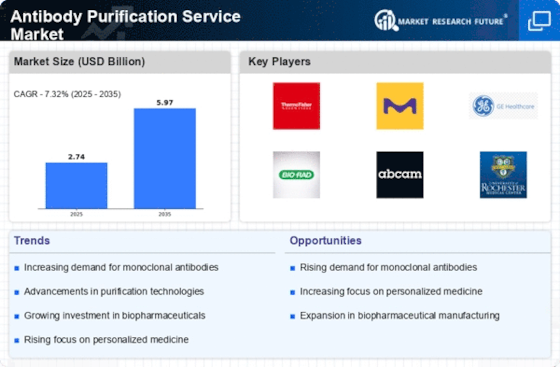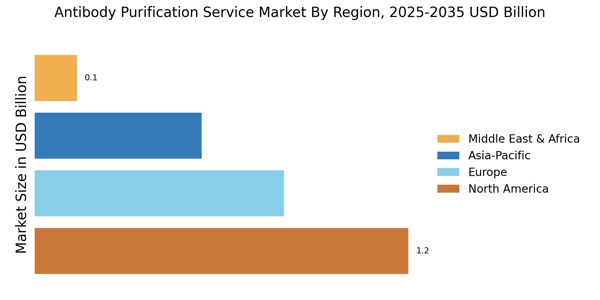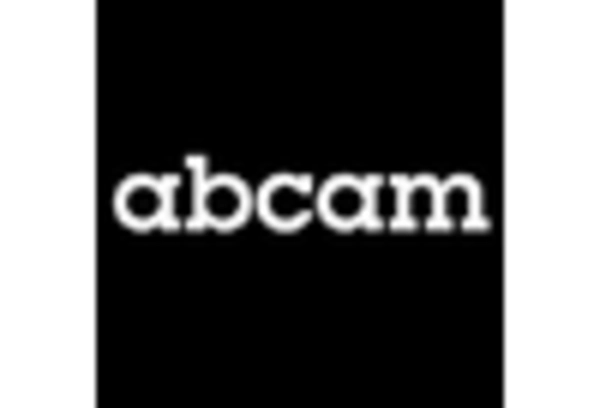Rising Demand for Monoclonal Antibodies
The increasing prevalence of chronic diseases and the growing focus on personalized medicine are driving the demand for monoclonal antibodies. This trend is particularly evident in the Antibody Purification Service Market, where the need for high-quality purification processes is paramount. According to recent estimates, the monoclonal antibody market is projected to reach USD 300 billion by 2025, indicating a robust growth trajectory. As pharmaceutical companies invest in research and development, the demand for specialized antibody purification services is likely to rise, necessitating advanced purification techniques to ensure product efficacy and safety. This surge in demand is expected to create significant opportunities for service providers within the Antibody Purification Service Market.
Regulatory Compliance and Quality Assurance
The Antibody Purification Service Market is heavily influenced by stringent regulatory requirements and the need for quality assurance. Regulatory bodies are increasingly emphasizing the importance of compliance in the production of therapeutic antibodies. This has led to a heightened focus on purification processes that meet these standards. Companies that prioritize quality and adhere to regulatory guidelines are likely to gain trust and credibility in the market. As the demand for high-quality therapeutic antibodies continues to grow, the emphasis on compliance will drive the need for specialized purification services. This trend suggests that the Antibody Purification Service Market will continue to evolve in response to regulatory pressures.
Increased Investment in Biopharmaceutical Research
The biopharmaceutical sector is experiencing a surge in investment, which is significantly impacting the Antibody Purification Service Market. With funding directed towards the development of novel therapeutics, there is a corresponding increase in the demand for high-quality antibody purification services. Reports indicate that biopharmaceutical investments have reached over USD 200 billion in recent years, reflecting a strong commitment to innovation. This influx of capital is likely to bolster the capabilities of service providers, enabling them to meet the growing needs of researchers and developers in the field. As a result, the Antibody Purification Service Market stands to benefit from this trend, as more companies seek reliable purification solutions.
Technological Advancements in Purification Techniques
The Antibody Purification Service Market is witnessing a wave of technological advancements that enhance purification efficiency and reduce costs. Innovations such as affinity chromatography, membrane filtration, and automated purification systems are becoming increasingly prevalent. These technologies not only streamline the purification process but also improve yield and purity levels, which are critical for therapeutic applications. As the industry evolves, companies that adopt these advanced techniques are likely to gain a competitive edge. Furthermore, the integration of artificial intelligence and machine learning in purification processes may lead to more precise and efficient methodologies, thereby driving growth in the Antibody Purification Service Market.
Growing Applications in Diagnostic and Therapeutic Areas
The applications of antibodies in diagnostics and therapeutics are expanding, which is positively impacting the Antibody Purification Service Market. With the rise of immunoassays, targeted therapies, and biosimilars, the need for purified antibodies is becoming increasingly critical. The market for diagnostic antibodies alone is projected to grow significantly, driven by advancements in disease detection and monitoring. As healthcare providers seek more effective diagnostic tools and treatments, the demand for high-quality antibody purification services is likely to increase. This trend indicates a promising future for the Antibody Purification Service Market, as it adapts to the evolving needs of the healthcare landscape.


















